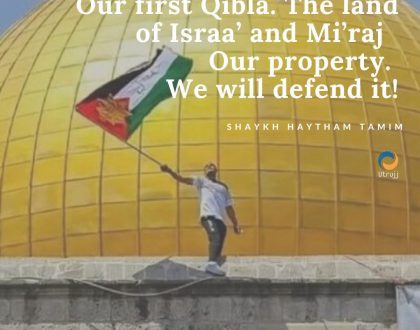(1:1) When Praise is more than a Phrase

How to address nobility
When we communicate with Allah Almighty, how do we start? How can we express our needs to Him without being rude or gauche?
All praise (and thanks) belong to Allah, Lord of all the worlds (1:1)
Anyone appearing before majesty would feel inadequate, perhaps speechless unless they had been taught the correct manner of addressing nobility. So Allah Almighty has taught us the perfect etiquette for our dialogue with Him.
Allah Almighty shows us the correct protocol of undertaking any task is starting with isti’adha (seeking His protection from harm), commencing the action with the basmalah (seeking blessings through His name), and completing the action with His hamd (gratitude and praise).
Yet, how do we praise Him when we feel understandably inadequate to do this. And when our praise of Allah Almighty will always fall short?
Though it is not an authentic narration, Ibn Kathir and Ibn Abi Hatim mentioned that Prophet Dawood (peace be upon him) asked Allah Almighty: ‘How do I praise You if everything is from You?’ Allah Almighty replied to Dawood (peace be upon him) ‘Now you have praised me.’
And our Prophet (peace upon him) said, ‘I cannot praise You as You have praised Yourself.’
This is why Allah Almighty has given us the expression of hamd. In the very first surah of the Qur’an we are taught the phrase ‘alhamdulilahi’ meaning ‘all praise to Allah.’ It is not just any praise, but all praise. It means that anytime any praise we say the real recipient of that praise is Allah Almighty. It is the most perfect and unlimited praise.
Praise is not just lip service, it is a recognition that absolutely everything we have is from Allah. So while praise is not usually synonymous with gratitude, alhamdulilah is not an empty phrase but an attitude. It’s an attitude of gratitude. It is the realisation and acknowledgment of the fact that He provided us with everything we have – material and otherwise, including knowledge, happiness, relationships, security and health.
Saying this short word, which has been granted the honour of being the opening phrase of the entire Qur’an, keeps our hearts engaged with Allah Almighty and can be used to make dhikr anytime.
Whenever the Prophet (peace be upon him) would say, ‘alhamdulillah’, it would fill his entire heart with His name and this would bring him tranquility. This is far removed from the expression that life is ‘OK, not bad’. Instead, we accept that whatever situation we face, no matter how challenging or bitter it may seem, there is ‘khair’ (goodness) in it and for this we are grateful. Alhamdulilah is not just admiration of Allah Almighty’s greatness but also recognition of His favours. It is an ongoing basis of our relationship, as we express thanks to Him for everything that is happening in our lives. Without Him, we have nothing, so our gratitude deepens into humility and submission.
The true meaning of hamd is expressed when our hearts, tongues and bodies are all engaged in fulfilling the purpose for which they were created. We should use all our faculties in His service, and every single cell praise Allah Almighty for His countless provisions.
Real praise is when we utilise Allah’s blessings in His way. Whether we spend in charity, spread knowledge, feed the poor for Allah Almighty’s sake, or remember Him, raise our children to serve His message and so on. Every action performed with the correct intention and with ikhlas (sincerity), is transformed into an act of worship, and an act of praise.
This is why the true expression of hamd is through three aspects: inner praise, which is with the heart; verbal praise, with the tongue; and practical/physical praise, which is with the limbs. We should implement these ourselves and teach them to our children.
Alhamdulilah is praise, gratitude and submission rolled into one.
Delivered by Shaykh Haytham Tamim in his Tafseer Class. Transcribed by Saania Bhatti.
- The truth is more powerful than lies
- Does a bride’s wali have to be Muslim?
- Is is permissible to lead a salah split over different rooms?
- Global IT outage. When systems go down…
- The concept of worship. What are ibadah and ihsan – and how do they lead to self development?
Recommended Posts

Ghazali on shukr (gratitude)
September 10, 2022

Lessons in victory from Surat Al Ahzab
May 12, 2021

